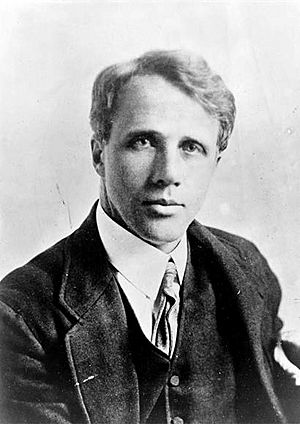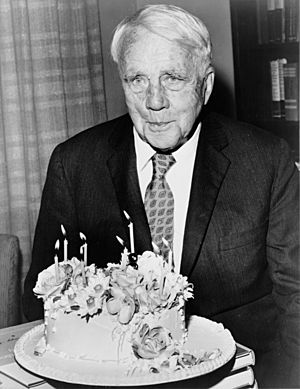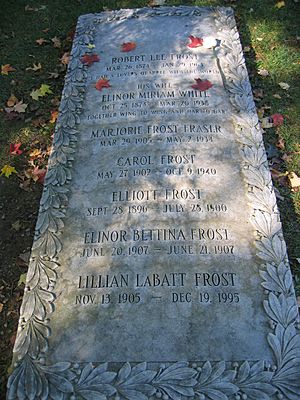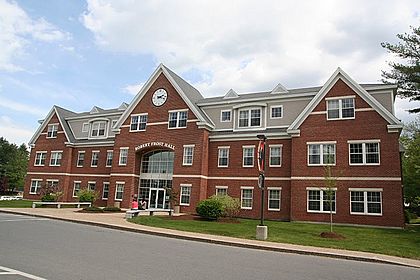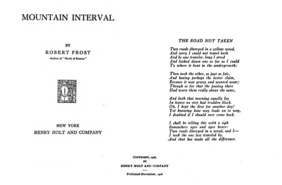Robert Frost facts for kids
Quick facts for kids
Robert Frost
|
|
|---|---|
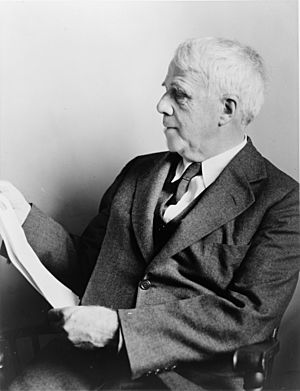
Frost in 1941
|
|
| Born | Robert Lee Frost March 26, 1874 San Francisco, California, U.S. |
| Died | January 29, 1963 (aged 88) Boston, Massachusetts, U.S. |
| Occupation | Poet, playwright |
| Alma mater | Dartmouth College (no degree) Harvard University (no degree) |
| Notable works | A Boy's Will, North of Boston, New Hampshire |
| Notable awards |
|
| Spouse |
Elinor Miriam White
(m. 1895; died 1938) |
| Children | 6 |
| Signature | |
Robert Lee Frost (March 26, 1874 – January 29, 1963) was an American poet. His work was initially published in England before it was published in the United States. Known for his realistic depictions of rural life and his command of American colloquial speech, Frost frequently wrote about settings from rural life in New England in the early 20th century, using them to examine complex social and philosophical themes.
Frequently honored during his lifetime, Frost is the only poet to receive four Pulitzer Prizes for Poetry. He became one of America's rare "public literary figures, almost an artistic institution". He was awarded the Congressional Gold Medal in 1960 for his poetic works. On July 22, 1961, Frost was named poet laureate of Vermont.
Contents
Biography
Early life
Robert Frost was born in San Francisco to journalist William Prescott Frost Jr. and Isabelle Moodie. His father was a descendent of Nicholas Frost of Tiverton, Devon, England, who had sailed to New Hampshire in 1634 on the Wolfrana, and his mother was a Scottish immigrant.
Frost was also a descendant of Samuel Appleton, one of the early English settlers of Ipswich, Massachusetts, and Rev. George Phillips, one of the early English settlers of Watertown, Massachusetts.
Frost's father was a teacher and later an editor of the San Francisco Evening Bulletin (which later merged with the San Francisco Examiner), and an unsuccessful candidate for city tax collector. After his death on May 5, 1885, the family moved across the country to Lawrence, Massachusetts, under the patronage of Robert's grandfather William Frost Sr., who was an overseer at a New England mill. Frost graduated from Lawrence High School in 1892. Frost's mother joined the Swedenborgian church and had him baptized in it, but he left it as an adult.
Although known for his later association with rural life, Frost grew up in the city, and he published his first poem in his high school's magazine. He attended Dartmouth College for two months, long enough to be accepted into the Theta Delta Chi fraternity. Frost returned home to teach and to work at various jobs, including helping his mother teach her class of unruly boys, delivering newspapers, and working in a factory maintaining carbon arc lamps. He said that he did not enjoy these jobs, feeling that his true calling was to write poetry.
Adult years
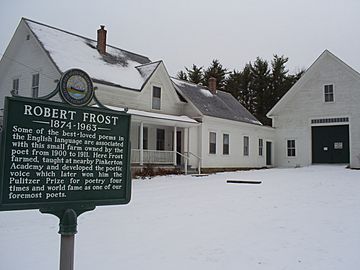
In 1894, he sold his first poem, "My Butterfly. An Elegy" (published in the November 8, 1894, edition of The Independent of New York) for $15 ($507 today). Proud of his accomplishment, he proposed marriage to Elinor Miriam White, but she demurred, wanting to finish college (at St. Lawrence University) before they married. Frost then went on an excursion to the Great Dismal Swamp in Virginia and asked Elinor again upon his return. Having graduated, she agreed, and they were married at Lawrence, Massachusetts, on December 19, 1895.
Frost attended Harvard University from 1897 to 1899, but he left voluntarily due to illness. Shortly before his death, Frost's grandfather purchased a farm for Robert and Elinor in Derry, New Hampshire; Frost worked the farm for nine years while writing early in the mornings and producing many of the poems that would later become famous. Ultimately his farming proved unsuccessful and he returned to the field of education as an English teacher at New Hampshire's Pinkerton Academy from 1906 to 1911, then at the New Hampshire Normal School (now Plymouth State University) in Plymouth, New Hampshire.
In 1912, Frost sailed with his family to Great Britain, settling first in Beaconsfield, a small town in Buckinghamshire outside London. His first book of poetry, A Boy's Will, was published the next year. In England he made some important acquaintances, including Edward Thomas (a member of the group known as the Dymock poets and Frost's inspiration for "The Road Not Taken"), T. E. Hulme, and Ezra Pound. Although Pound would become the first American to write a favorable review of Frost's work, Frost later resented Pound's attempts to manipulate his American prosody. Frost met or befriended many contemporary poets in England, especially after his first two poetry volumes were published in London in 1913 (A Boy's Will) and 1914 (North of Boston).
In 1915, during World War I, Frost returned to America, where Holt's American edition of A Boy's Will had recently been published, and bought a farm in Franconia, New Hampshire, where he launched a career of writing, teaching, and lecturing. This family homestead served as the Frosts' summer home until 1938. It is maintained today as The Frost Place, a museum and poetry conference site. He was made an honorary member of Phi Beta Kappa at Harvard in 1916. During the years 1917–20, 1923–25, and, on a more informal basis, 1926–1938, Frost taught English at Amherst College in Massachusetts, notably encouraging his students to account for the myriad sounds and intonations of the spoken English language in their writing. He called his colloquial approach to language "the sound of sense".
In 1924, he won the first of four Pulitzer Prizes for the book New Hampshire: A Poem with Notes and Grace Notes. He would win additional Pulitzers for Collected Poems in 1931, A Further Range in 1937, and A Witness Tree in 1943.
For forty-two years – from 1921 to 1962 – Frost spent almost every summer and fall teaching at the Bread Loaf School of English of Middlebury College, at its mountain campus at Ripton, Vermont. He is credited with being a major influence upon the development of the school and its writing programs. The college now owns and maintains his former Ripton farmstead, a National Historic Landmark, near the Bread Loaf campus. In 1921, Frost accepted a fellowship teaching post at the University of Michigan, Ann Arbor, where he resided until 1927, when he returned to teach at Amherst. While teaching at the University of Michigan, he was awarded a lifetime appointment at the university as a Fellow in Letters. The Robert Frost Ann Arbor home was purchased by The Henry Ford Museum in Dearborn, Michigan, and relocated to the museum's Greenfield Village site for public tours. Throughout the 1920s, Frost also lived in his colonial-era house in Shaftsbury, Vermont. In 2002, the house was opened to the public as the Robert Frost Stone House Museum in 2002 and was given to Bennington College in 2017.
In 1934, Frost began to spend winter months in Florida. In March 1935, he gave a talk at the University of Miami. In 1940, he bought a 5-acre (2.0 ha) plot in South Miami, Florida, naming it Pencil Pines; he spent his winters there for the rest of his life. In her memoir about Frost's time in Florida, Helen Muir writes, "Frost had called his five acres Pencil Pines because he said he had never made a penny from anything that did not involve the use of a pencil." His properties also included a house on Brewster Street in Cambridge, Massachusetts.
Harvard's 1965 alumni directory notes that that Frost received an honorary degree there. Although he never graduated from college, Frost received over 40 honorary degrees, including from Princeton, Oxford and Cambridge universities, and became the only person to have received two honorary degrees from Dartmouth College. During his lifetime, the Robert Frost Middle School in Fairfax, Virginia, the Robert L. Frost School in Lawrence, Massachusetts, and the main library of Amherst College were named after him.
In 1960, Frost was awarded a United States Congressional Gold Medal, "In recognition of his poetry, which has enriched the culture of the United States and the philosophy of the world"; it was formally bestowed on him by President Kennedy in March 1962. Also in 1962, he was awarded the Edward MacDowell Medal for outstanding contribution to the arts by the MacDowell Colony.
Frost was 86 when he performed a reading at the inauguration of John F. Kennedy on January 20, 1961. He began by attempting to read his poem "Dedication", which he had composed for the occasion, but due to the brightness of the sunlight he was unable to see the text, so he recited "The Gift Outright" from memory instead.
In the summer of 1962, Frost accompanied Interior Secretary Stewart Udall on a visit to the Soviet Union in hopes of meeting Nikita Khrushchev to lobby for peaceful relations between the two Cold War powers.
Frost died in Boston on January 29, 1963, of complications from prostate surgery. He was buried in the Old Bennington Cemetery in Bennington, Vermont. His epitaph, from the last line of his poem, "The Lesson for Today" (1942), is: "I had a lover's quarrel with the world."
One of the original collections of Frost materials, which he personally helped compile, is held in the Special Collections department of the Jones Library in Amherst, Massachusetts. The collection consists of approximately twelve thousand items, including original manuscript poems and letters, correspondence, photographs, and audio and visual recordings. The Archives and Special Collections at Amherst College holds a small collection of his papers. The University of Michigan Library holds the Robert Frost Family Collection of manuscripts, photographs, printed items, and artwork. The most significant collection of Frost's working manuscripts is held by Dartmouth.
Personal life
Frost's personal life was plagued by grief and loss. In 1885, when he was 11, his father died of tuberculosis, leaving the family with just eight dollars. Frost's mother died of cancer in 1900. In 1920, he had to commit his younger sister Jeanie to a mental hospital, where she died nine years later. Mental illness apparently ran in Frost's family, as both he and his mother suffered from depression, and his daughter Irma was committed to a mental hospital in 1947. Frost's wife, Elinor, also experienced bouts of depression.
Elinor and Robert Frost had six children: son Elliott (1896–1900, died of cholera); daughter Lesley Frost Ballantine (1899–1983); son Carol (1902–1940); daughter Irma (1903–1967); daughter Marjorie (1905–1934, died as a result of puerperal fever after childbirth); and daughter Elinor Bettina (died just one day after her birth in 1907). Only Lesley and Irma outlived their father. Frost's wife, who had heart problems throughout her life, developed breast cancer in 1937, and died of heart failure in 1938.
Work
Themes
In Contemporary Literary Criticism, the editors state that "Frost's best work explores fundamental questions of existence, depicting with chilling starkness the loneliness of the individual in an indifferent universe." The critic T. K. Whipple focused on this bleakness in Frost's work, stating that "in much of his work, particularly in North of Boston, his harshest book, he emphasizes the dark background of life in rural New England, with its degeneration often sinking into total madness."
In sharp contrast, the founding publisher and editor of Poetry, Harriet Monroe, emphasized the folksy New England persona and characters in Frost's work, writing that "perhaps no other poet in our history has put the best of the Yankee spirit into a book so completely." She notes his frequent use of rural settings and farm life, and she likes that in these poems, Frost is most interested in "showing the human reaction to nature's processes." She also notes that while Frost's narrative, character-based poems are often satirical, Frost always has a "sympathetic humor" towards his subjects.
Influenced by
Influenced
- Robert Francis
- Seamus Heaney
- Richard Wilbur
- Edward Thomas
- James Wright
Awards and recognition
Frost was nominated for the Nobel Prize in Literature 31 times.
In June 1922, the Vermont State League of Women's Clubs elected Frost as Poet Laureate of Vermont. When a New York Times editorial strongly criticised the decision of the Women's Clubs, Sarah Cleghorn and other women wrote to the newspaper defending Frost. On July 22, 1961, Frost was named Poet Laureate of Vermont by the state legislature through Joint Resolution R-59 of the Acts of 1961, which also created the position.
Robert Frost won the 1963 Bollingen Prize.
Pulitzer Prizes
- 1924 for New Hampshire: A Poem With Notes and Grace Notes
- 1931 for Collected Poems
- 1937 for A Further Range
- 1943 for A Witness Tree
Legacy and cultural influence
- Robert Frost Hall is an academic building at Southern New Hampshire University in Manchester, New Hampshire.
- In the early morning of November 23, 1963, Westinghouse Broadcasting's Sid Davis reported the arrival of President John F. Kennedy's casket at the White House. Since Frost was one of the President's favorite poets, Davis concluded his report with a passage from "Stopping by Woods on a Snowy Evening", but was overcome with emotion as he signed off.
- Jawaharlal Nehru (1889–1964), the first Prime Minister of India, had kept a book of Robert Frost's close to him towards his later years, even at his bedside table as he lay dying.
- The poem "Nothing Gold Can Stay" is featured in both the 1967 novel The Outsiders by S. E. Hinton and the 1983 film adaptation, first recited aloud by the character Ponyboy to his friend Johnny. In a subsequent scene Johnny quotes a stanza from the poem back to Ponyboy by means of a letter which was read after he passes away.
- His poem "Fire and Ice" influenced the title and other aspects of George R. R. Martin's fantasy series A Song of Ice and Fire.
- Nothing Gold Can Stay is the name of the debut studio album by American pop-punk band New Found Glory, released on October 19, 1999.
- At the funeral of former Canadian prime minister Pierre Trudeau, on October 3, 2000, his eldest son Justin rephrased the last stanza of the poem "Stopping by Woods on a Snowy Evening" in his eulogy: "The woods are lovely, dark and deep. He has kept his promises and earned his sleep."
- A Garfield comic strip published on October 20, 2002, originally featured the titular character reciting "Nothing Gold Can Stay". However, this was replaced in book collections and online edition, likely due to the poem being still under copyright when the comic ran (the poem has since lapsed into public domain, in 2019).
- The poem "Fire and Ice" is the epigraph of Stephenie Meyer's 2007 book, Eclipse, of the Twilight Saga. It is also read by Kristen Stewart's character, Bella Swan, at the beginning of the 2010 Eclipse film.
- "Nothing Gold Can Stay" is referenced in First Aid Kit's 2014 album Stay Gold: "But just as the moon it shall stray / So dawn goes down today / No gold can stay / No gold can stay."
- "Nothing Gold Can Stay" (February 4, 2015) is the title given to the tenth episode of the seventh season of The Mentalist.
- The character of Baron Quinn recites "Fire and Ice" in an episode of AMC's Into the Badlands.
- Verses of "Fire and Ice" are referenced and recited throughout the 2017 episodic video game Life Is Strange: Before the Storm.
Selected works
Poetry collections
- 1913. A Boy's Will. London: David Nutt (New York: Holt, 1915)
- 1914. North of Boston. London: David Nutt (New York: Holt, 1914)
- "After Apple-Picking"
- "The Death of the Hired Man"
- "Mending Wall"
- 1916. Mountain Interval. New York: Holt
- "Birches"
- "Out, Out"
- "The Oven Bird"
- "The Road Not Taken"
- 1923. Selected Poems. New York: Holt.
- "The Runaway"
- Also includes poems from first three volumes
- 1923. New Hampshire. New York: Holt (London: Grant Richards, 1924)
- "Fire and Ice"
- "Nothing Gold Can Stay"
- "Stopping by Woods on a Snowy Evening"
- 1924. Several Short Poems. New York: Holt
- 1928. Selected Poems. New York: Holt.
- 1928. West-Running Brook. New York: Holt
- "Acquainted with the Night"
- 1929. The Lovely Shall Be Choosers, The Poetry Quartos, printed and illustrated by Paul Johnston. Random House.
- 1930. Collected Poems of Robert Frost. New York: Holt (UK: Longmans Green, 1930)
- 1933. The Lone Striker. US: Knopf
- 1934. Selected Poems: Third Edition. New York: Holt
- 1935. Three Poems. Hanover, NH: Baker Library, Dartmouth College.
- 1935. The Gold Hesperidee. Bibliophile Press.
- 1936. From Snow to Snow. New York: Holt.
- 1936. A Further Range. New York: Holt (Cape, 1937)
- 1939. Collected Poems of Robert Frost. New York: Holt (UK: Longmans, Green, 1939)
- 1942. A Witness Tree. New York: Holt (Cape, 1943)
- "The Gift Outright"
- "A Question"
- "The Silken Tent"
- 1943. Come In, and Other Poems. New York: Holt.
- 1947. Steeple Bush. New York: Holt
- 1949. Complete Poems of Robert Frost. New York: Holt (Cape, 1951)
- 1951. Hard Not To Be King. House of Books.
- 1954. Aforesaid. New York: Holt.
- 1959. A Remembrance Collection of New Poems. New York: Holt.
- 1959. You Come Too. New York: Holt (UK: Bodley Head, 1964)
- 1962. In the Clearing. New York: Holt Rinehart & Winston
- 1969. The Poetry of Robert Frost. New York: Holt Rinehart & Winston.
Plays
- 1929. A Way Out: A One Act Play (Harbor Press).
- 1929. The Cow's in the Corn: A One Act Irish Play in Rhyme (Slide Mountain Press).
- 1945. A Masque of Reason (Holt).
- 1947. A Masque of Mercy (Holt).
Letters
- 1963. The Letters of Robert Frost to Louis Untermeyer (Holt, Rinehart & Winston; Cape, 1964).
- 1963. Robert Frost and John Bartlett: The Record of a Friendship, by Margaret Bartlett Anderson (Holt, Rinehart & Winston).
- 1964. Selected Letters of Robert Frost (Holt, Rinehart & Winston).
- 1972. Family Letters of Robert and Elinor Frost (State University of New York Press).
- 1981. Robert Frost and Sidney Cox: Forty Years of Friendship (University Press of New England).
- 2014. The Letters of Robert Frost, Volume 1, 1886–1920, edited by Donald Sheehy, Mark Richardson, and Robert Faggen. Belknap Press. ISBN: 978-0674057609. (811 pages; first volume, of five, of the scholarly edition of the poet's correspondence, including many previously unpublished letters.)
- 2016. The Letters of Robert Frost, Volume 2, 1920–1928, edited by Donald Sheehy, Mark Richardson, Robert Bernard Hass, and Henry Atmore. Belknap Press. ISBN: 978-0674726642. (848 pages; second volume of the series.)
Other
- 1957. Robert Frost Reads His Poetry. Caedmon Records, TC1060. (spoken word)
- 1966. Interviews with Robert Frost (Holt, Rinehart & Winston; Cape, 1967).
- 1995. Collected Poems, Prose and Plays, edited by Richard Poirier. Library of America. ISBN: 978-1-883011-06-2. (omnibus volume.)
- 2007. The Notebooks of Robert Frost, edited by Robert Faggen. Harvard University Press.
See also
 In Spanish: Robert Frost para niños
In Spanish: Robert Frost para niños
- List of poems by Robert Frost
- Frostiana
- New Hampshire Historical Marker No. 126: Robert Frost 1874–1963


